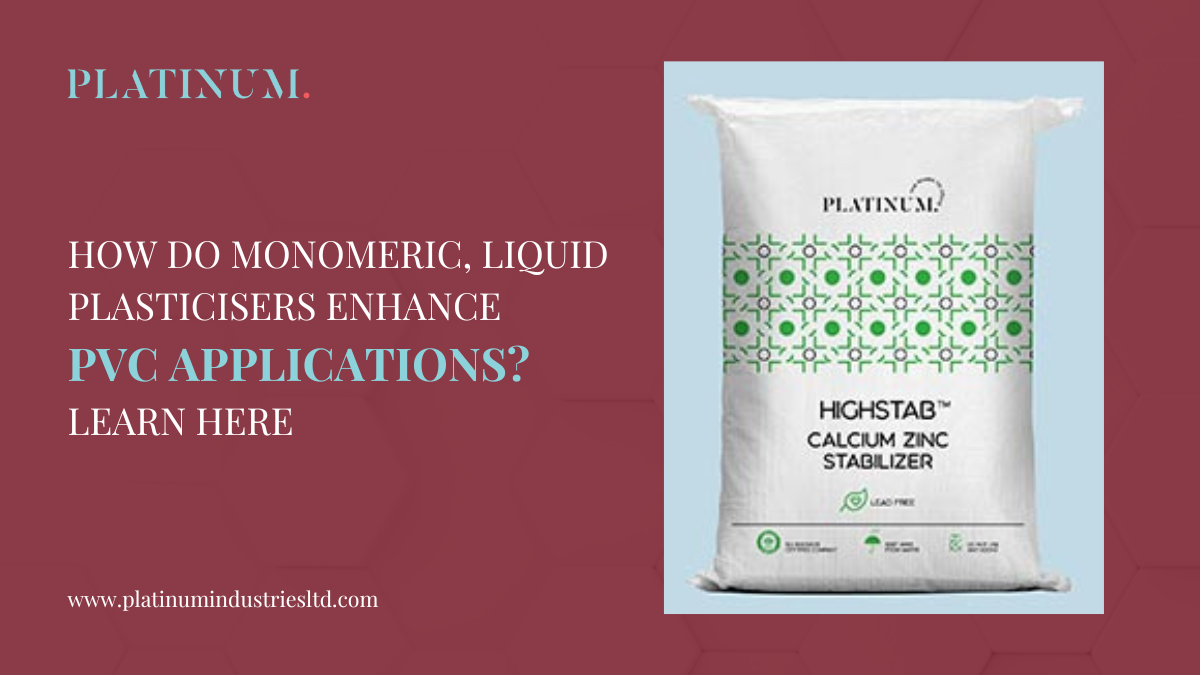Polyvinyl chloride (PVC) stands as a keystone of plastic material across various industries, owing to its versatility, durability, high potential for sustainability and cost-effectiveness. However, to expand its range of applications, the use of plasticisers especially monomeric, liquid plasticisers plays a crucial role.
In this blog, let’s learn more about the significance of monomeric, liquid plasticisers in enhancing PVC application areas in India and worldwide.
Understanding Monomeric, liquid plasticisers:
Monomeric, liquid plasticisers are additives that are commonly used in PVC formulations to improve flexibility. This group of substances contains organic compounds that interact with the polymer chains of PVC, increasing the intermolecular spaces and reducing the overall rigidity of the material. The use of monomeric, liquid plasticisers becomes imperative to tailor PVC products to specific needs.
Characterisation of Monomeric, liquid plasticisers in PVC Applications:
1. Differentiation of Plasticiser:
Plasticisers can be divided into different categories, monomeric and polymeric plasticisers. The monomeric plasticisers are generally liquid. When it comes to polymeric plasticisers, a distinction is made between liquid and solid ones. A distinction is also made between primary and secondary plasticisers. While the primary ones are very well-compatible with PVC, the secondary ones only have limited compatibility with PVC. Typical secondary plasticisers are epoxidized vegetable oils, such as epoxidized soybean oil, and chlorinated paraffin… Liquid polymeric plasticisers are of oligomeric esters of dicarboxylic acids, such as adipates with diols. Examples of solid polymeric plasticisers are chlorinated polyethene (CPE), acrylonitrile butadiene rubber (NBR), ethylene vinyl acetate (EVA) or its terpolymers with carbon monoxide.
2. Differentiation of Monomeric, Liquid Plasticiser by Chemistry:
Many monomer plasticisers that are still in use today are based on phthalic acid. However, these have come under legal pressure in Europe and to some extent in other markets. Alternatives are based on terephthalic, adipic, sebacic, azelaic, citric, trimellitic, benzoic and various other acids. They are esterified with C4 to C13 alcohols or with polyols.
3. Differentiation of Monomeric, Liquid Plasticiser by Function:
A general distinction is made here between general-purpose plasticisers (GP) and speciality plasticisers. If a plasticiser imparts a desired flexibility, it has a good balance of other properties and, additionally, low cost, it is called general purpose plasticiser. Specialities are self-explanatory.
4. Applications of Monomeric, Liquid Plasticiser:
The areas of application for plasticisers are as diverse as the applications of plasticized PVC in general. They range from cable sheathing and insulation to membranes for roofs, tunnel linings, geomembranes and floor coverings to toys and medical applications to artificial leather (also called vegan leather) and automotive interiors.
5. Sustainability of Monomeric, Liquid Plasticiser:
The sustainability potential of monomeric plasticisers is broad. On the one hand, the majority of today’s plasticisers are made from crude oil. They are comparatively inexpensive, but not at all sustainable. Products based on vegetable oils have a significantly higher sustainability potential. However, several of them are secondary plasticisers and cannot easily replace the GPs or there are other compromises in terms of costs and performance or availability. There are also a number of bio-attributed plasticisers that have high sustainability potential. Platinum Industries Ltd. researches plasticisers based on renewable resources that can compete with GP technically and cost-wise.
As we continue growing and expanding our industrial base, the demand for high-quality, performance-driven PVC products, and by extension monomeric, liquid plasticisers, will only increase. That is why Platinum Industries, the leading Calcium Zinc and Calcium-Organic PVC and CPVC stabilizer manufacturer, is committed to providing the best quality plasticisers to businesses, helping them manufacture high-grade products. Contact us to learn more about our solutions.
Platinum Industries Ltd., the best PVC stabilizer manufacturer in India, is a member of the Indian Vinyl Council (IVC).
Platinum Industries Ltd., a member of Indian Vinyl Council (IVC)

